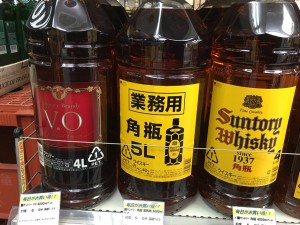Name: Zoran Peric
Role: Suntory Brand Ambassador
DOB: 07/07/1970
Birthplace: Belgrade, Serbia
Twitter Handle: @zoran_peric07
Website: www.realmix.co.uk
Fun Fact: Zoran was in a series of bands when he was younger
Zoran Peric began bartending at an early age in his native Belgrade, Serbia. He first came to London in 1996 bartending at the five-star Landmark Hotel where developed his passion for cocktails and began experimenting with unusual combinations.
In 1999 Zoran joined the United Kingdom Bartenders Guild as a committee member was eventually made a chairman for London and the South East, working with prominent industry leaders such as Peter Dorelli, Salvatore Calabrese and Daniel Crebesse.
Zoran joined D&D London in 2007, overseeing several of the group’s bars with a main focus on Skylon Restaurant, Bar and Grill and within a couple of years became a full time brand ambassador at Suntory where he drew inspiration from Japanese whiskey makers and the importance of ice carving in Japan.
Shekha: I first met you at a Suntory masterclass about Japanese whiskey and ice carving which was hosted at Young’s the Bull & Gate as part of the Wonderful World of Whisky with Young’s Pubs and Geronimo Inns masterclass series. Could you tell us a bit about your career to date?
Zoran: I started my career in 1996 in London, bartending for five-star hotels like Landmark, Sofitel and then I went into bar management. I joined D and D when they opened Skylon and went on to work with Cellar Hands and Suntory in 2008 and I have been with Suntory ever since.
Do you remember the moment you decided that you knew you were going to become part of the Suntory team?
In 2004 I was working at the Soho Hotel and it was one of the first bars that stocked Suntory. So I tried Yamazaki 12, Hakushu 12 and Hibiki 17. I started developing a passion for Japanese whiskies at a time when people were not so aware of them.
I moved then to Skylon and there I started getting approached to work with different brands. In the pipeline was Suntory and I thought: yes! I would really like to do that. I could see the potential with the brand and I really liked it and believed in it.
What sparked an interest in the drinks industry?
I started really early, working in bars aged 18 and 19. First of all purly to make quick money as I was trying to study. But then I ended up working in bars and I sai to myself, I really want to do this. But the potential for bars in London compared to back home was dramatic and I told myself I wanted to be the best.
What did you learn from working in different bars? Does any of it carry over to what you do now?
Yes, having that knowledge helped the most. I think to know different brands, you need to understand them decide what you can compare. It’s also about developing your palate, having tasting skills, communication skills as well. You pick up marketing techniques because you are around so many brands and recognise trends. People think bartending is just about drinking but you are involved in lots of things and looking into a wider range of skills. With the brand ambassador role you are networking with other bartenders and bars, tasting different brands, comparing them to yours and making sure you are at the top of your game.
What do you enjoy most and least about what you do?
Probably the fact that I like moving around and I really don’t like being stuck in one place, meeting new people, seeing different skills. I do trade and off-trade consumer tastings. I like to see what the consumers think about the brand.
I also enjoy visiting distilleries, such as the opportunity to go to Japan. When you get to a certain level you really start enjoying the travelling – it is hard work but you get to meet the people who make these whiskies. It is that environment, and shaing my knowledge and skills with other people that I enjoy – I am a bartender at the end of the day!
![Tasting Britain - Q&A Zoran Peric [Suntory]-0005](http://tastingbritain.com/wp-content/uploads/2016/03/Tasting-Britain-QA-Zoran-Peric-Suntory-0005-300x200.jpg)
Japanese whiskey has been around, as you said, for almost a century. Why is it only now that it is getting this recognition?
Suntory has three distilleries and they have lots of different businesses in which they work with other countries. My personal opinion is that I think they were not really encouraged to explore markets outside of Japan and Asia. Yamizaki received international recognition in 2003 when it was introduced to the UK and before that, the US.
I think they decided globally, it was time for their whiskies. Before then, there might have been a bit of scepticism about going to the West – there was a lot of big names but then they just decided to go out with Yamizaki 10.
In Japan, whiskey is almost always served with carved blocks of ice, right? Why is ice carving such a revered skill in Japan?
Ice goes way back in Japanese history. Apparently the Japanese have been using it before western civilisation and the first written record goes back to 7th century. In the countryside they would they would cut ice from frozen lakes store and store it in the caves, throughout the year. In Japan ice is a status of health; it stayed in food in drinks, in food, they liked to serve everything over ice blocks and you still have ice blocks in supermarkets. Even in the smallest sushi bar in Tokyo or Kyoto, nine times out of 10 you will be served your food on a block of ice. In Japan purity is key too – everything they do they want to do it the best and they push everything to the limit. When making whiskey there is no cutting corners and they like to use quality ingredients, including quality ice.
What qualities do you need to become a good carver? How did you get into it?
I’ve been influenced by Japanese whiskey for about ten years how and probably been using ice blocks on and off. I saw the way service worked in Japan. It wasn’t very easy to get into it, there are only a few bars in London that have blocks.
There is always that argument as well that you shouldn’t use any ice in whiskey. I also take this opinion but in Japan it this makes sense because of climate difference. It is humid, and they drink a lot of whiskey. If you are going to drink a lot of it, you need some dilution.
So, like I said, I traveled around these bars, watching Japanese bar tenders and got inspired. I went back to London and said – I’m going to do it. It was a brave move, but it was the right move. Visually it’s very interesting, you need a bit of theatre in what we do, and also because of dilution in quality whiskies, you also need top quality water.
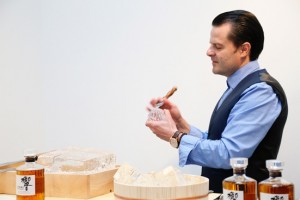
Suntory are discontinuing a few of their brands – what should people be looking out to grab before it’s gone and why?
People should look at the age statements. I wouldn’t say we were discontinuing per se, just that the availability is going to be different as we have become so popular. People are buying it but in certain location you will find certain age statements, and I would definitely look out for those.
The company does lots of other things, it is a major player in the world market – how do you think Suntory stays agile in the evolving working world?
They have the means to try different things and push the limits with what they do.
The global economy means that people seem to be looking to spend less on luxury items – do you think this will affect the demand of some of the more high end products you have?
I don’t think so. More people want luxury now than a few years back fuelled by this interest in celebrity lifestyles, so I think the market will grow stronger. In the next few years, I don’t think it will slow down at all.
What’s your greatest/most memorable professional moment been, so far?
In the work environment it’s always nice when some nobody comes to you says you’re doing a great job and we really appreciate your hard work. That kind of recognition from contemporaries in my trade does it for me. People that understand the passion we have, that is the best.
What is your all time favourite drink to make and consume
Forest Highball – that’s my drink. It is Hakushu 12, soda water and fresh mint. When I walk into a bar, I like them to make that drink for me. It is very simple, very refreshing and beautiful with lots of ice.
Where do you get your ideas?
Throughout my career, having product knowledge and being a cocktail bar tender mixing different drinks is one my greatest passions which still lives with me. People still think of me as a cocktail bar tender and I learned lots of things. It’s like being a chef, you learn certain flavours and it’s the same with other bar tenders – they are liquid chefs; it’s a chemistry. I like to use unique ingredients not many other bars will have and then they can follow you and get inspiration form that. But to be a leader in something you need to find the winding combination, mix it and sell it and that is something Suntory does so well.
What’s your philosophy, summed up in a sentence?
Passion – you really need to love what you do – I really put my soul and hard work into what I do
Integrity – be honest with people you work with
Sharing your skills
So, yes – passion, honesty hard work and sharing
Whereabouts do you live (I’m assuming somewhere in London but I might be wrong) and what’s good near you when it comes to food and drink?
I used to live in Peckham and places in Clapham would be my hub. One of my favourites is 64th&Social; those guys are amazing.
I also love Chiltern firehouse, the manager there is very good friend and if you walk in on your own and walk out, you will still have an amazing time. A good bartender who is entertaining, can work miracles!
What’s the biggest challenge you’ve had, how did you overcome it, and what did you learn from it?
I took a very niche brand when there was a lot of fear about going against the big boys, especially against Scotch. And always, I used to say to people that, I am not really going against them, I am just offering a taste of something different. But in the past that was really difficult sometimes – especially as some consumers couldn’t think of a reason to try it if it was not better than Scotch. But I overcame this with a simple philosophy that I am just here to offer a sample of something different, and if you like it, great.
If you weren’t doing what you do now, what would you be doing instead?
I would probably be a musician. I had a few bands back home and always had a passion for music.
Who would be your ideal whiskey drinking buddy if you could pick anyone living or dead?
Shinjiro Torii
What’s your ultimate aim and goal? Money and reality are no obstacle, so shoot for the moon…
I have a few goals but if money is no object, maybe a bar and training school, but also helping bartenders and delivering for consumers at the same time. I would also maybe get a band together!
Where next for you and the business?
Maybe stick around and make sure the brand is still doing great and keeping up the that image. It is very important with brands, like so many other things in life, what goes up may always come down. So you need to make sure the brand is always up because what might be trendy today, may not be trendy tomorrow. You need to make sure the trend becomes a standard. It’s lovely now you can open a menu and see Japanese whiskey, it is moving from being a trend to a standard and keeping this standard high, is the next big task.
And we always ask three customary ridiculous questions…
If you could combine three animals to make one super-animal – which ones would you combine?
I would like to combine flying, speed and water. So the animal would have to have very good diving skills, flying skills and running skills. A combination of bird, horse and fish together? I guess that would be great. It’s important that I should add that he wouldn’t be an aggressive animal but a very peaceful and positive one.
If you could be transported into any period of history, anywhere in the world – where would you go, what year would it be and why?
I’d rather go into the future than the past – I would like to see what the quality of life is like- and to see what London, New York and Tokyo would look in 3000- and something. I think travelling to a different planet would be for me.
If the Zombie Apocalypse was upon us, what would your survival strategy be?
First you need to learn about them and then get ready!
![Tasting Britain - Q&A Zoran Peric [Suntory]-0003](http://tastingbritain.com/wp-content/uploads/2016/03/Tasting-Britain-QA-Zoran-Peric-Suntory-0003.jpg)
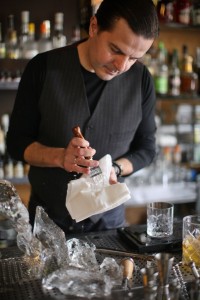
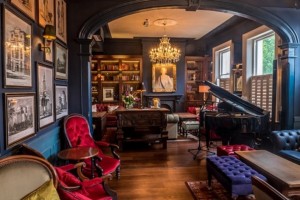
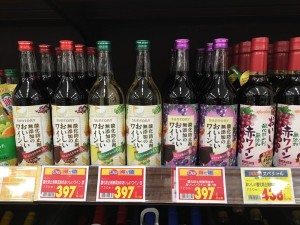
![Tasting Britain - Q&A Zoran Peric [Suntory]-0001](http://tastingbritain.com/wp-content/uploads/2016/03/Tasting-Britain-QA-Zoran-Peric-Suntory-0001-200x300.jpg)
